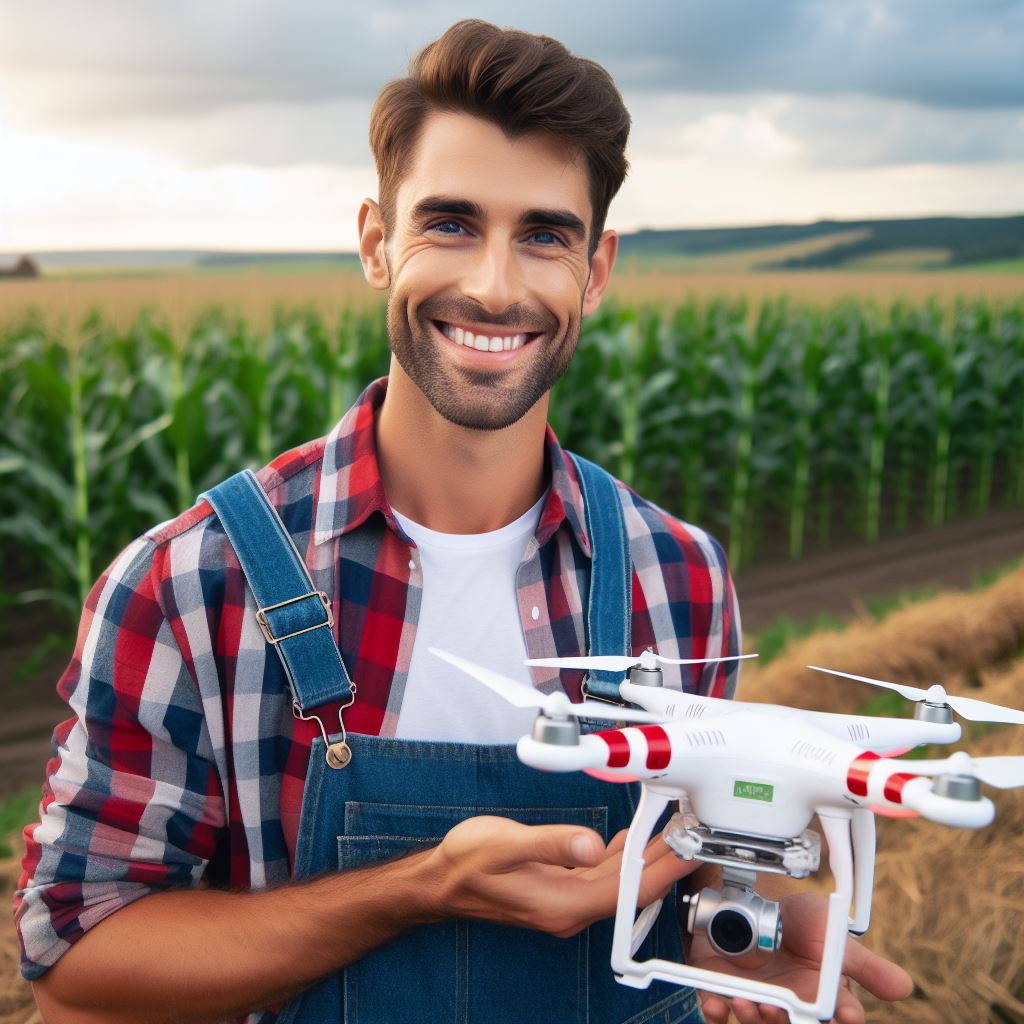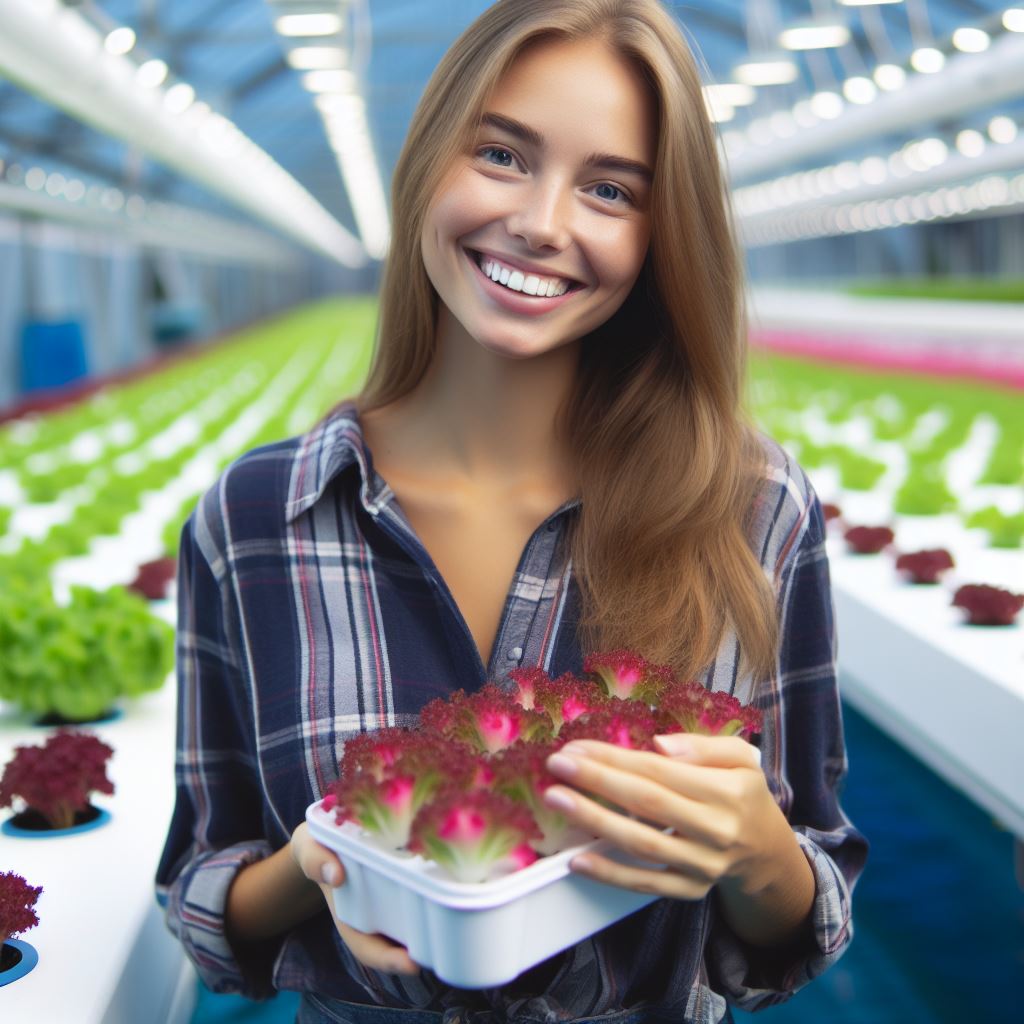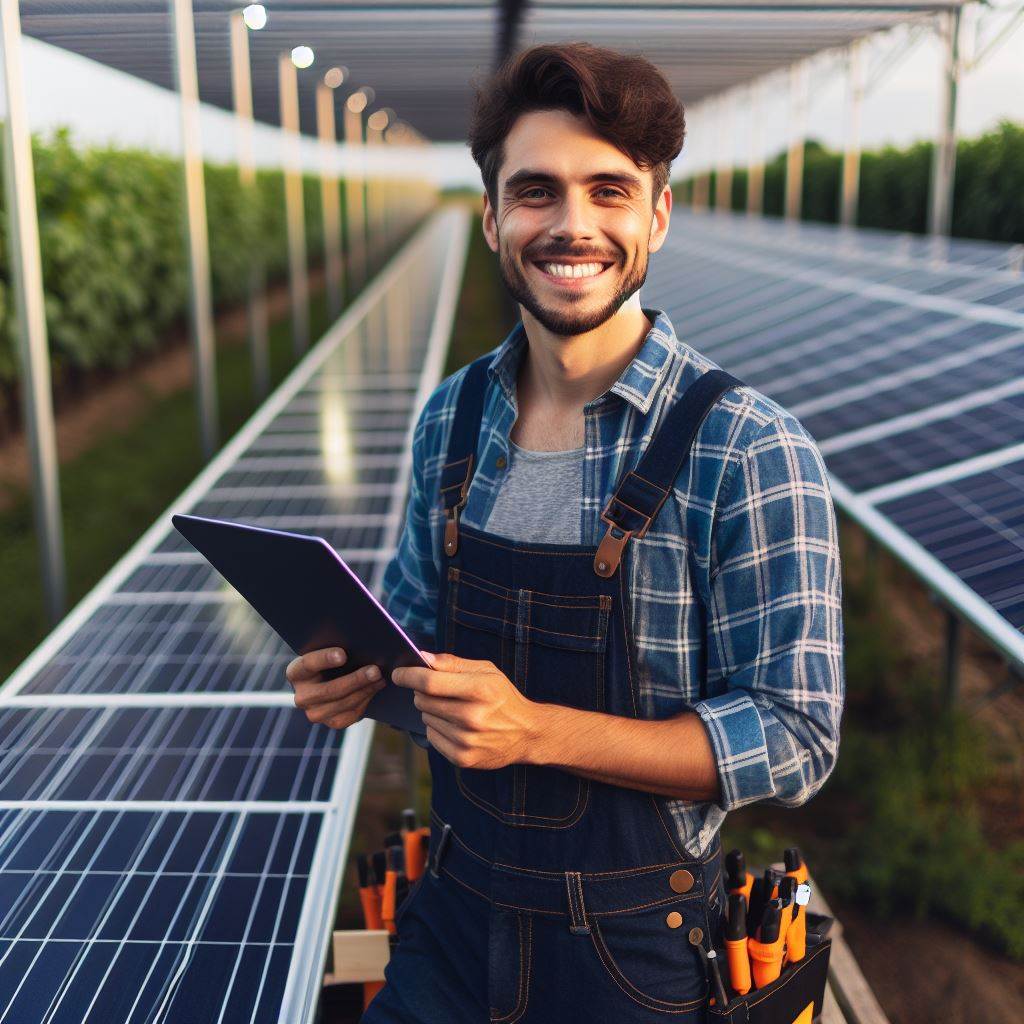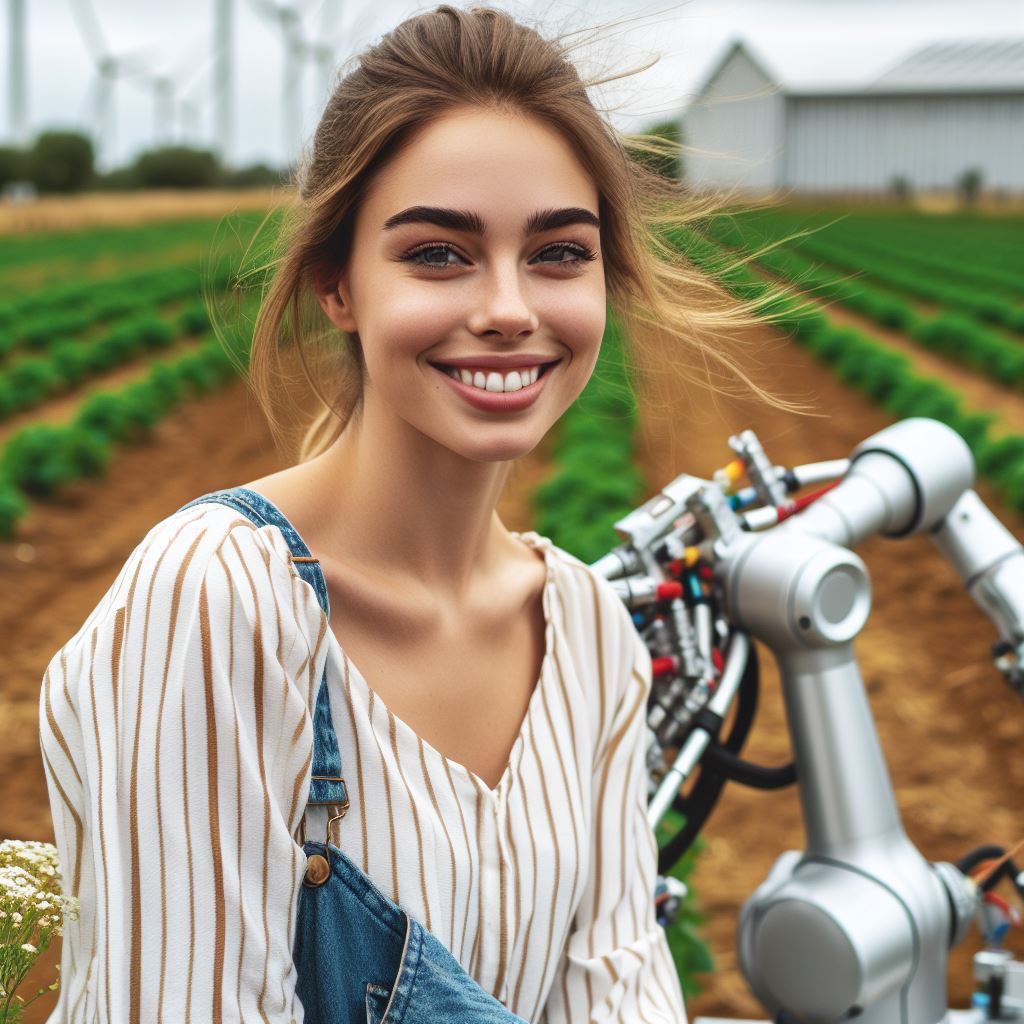Introduction
Agricultural technology has evolved significantly over the years, introducing new and innovative solutions to address the challenges faced by farmers.
One such groundbreaking innovation is the development of smart drones for farming purposes.
Smart drones, equipped with advanced technology, are revolutionizing the agricultural industry.
They play a pivotal role in increasing efficiency and productivity, ultimately transforming the way farming is conducted.
Definition of smart drones
Smart drones, also known as agricultural drones, are unmanned aerial vehicles (UAVs) integrated with cutting-edge technology.
They are specifically designed for agricultural purposes, equipped with sensors, cameras, and GPS systems.
Importance of technology in agriculture
Technology has become an indispensable tool in the agricultural sector, enabling farmers to overcome numerous challenges.
It has played a crucial role in maximizing yield, monitoring crop health, reducing labor costs, and optimizing the use of resources.
Thesis statement: Smart drones are revolutionizing farming by increasing efficiency and productivity.
Smart drones have emerged as a game-changer in the world of farming.
These autonomous flying machines have the potential to transform traditional agricultural practices.
By incorporating sophisticated technology, they simplify and streamline various aspects of farming operations, thereby enhancing overall efficiency and productivity.
These drones can carry out a range of tasks such as aerial mapping, crop monitoring, pesticide spraying, and irrigation management.
With high-resolution cameras and sensors, they can capture detailed images and collect data about crop health, soil moisture, nutrient levels, and pest infestations.
The data gathered by smart drones is then analyzed to provide farmers with valuable insights.
This information helps farmers make informed decisions, such as identifying areas that require immediate attention, optimizing fertilizer and pesticide usage, and forecasting crop yields.
Moreover, smart drones significantly reduce the need for manual labor, saving farmers both time and money.
They can cover large areas in a short period, identifying potential issues before they escalate, ultimately preventing crop damage and losses.
In general, smart drones are revolutionizing farming by introducing a new era of precision agriculture.
By enhancing efficiency, productivity, and cost-effectiveness, these drones are proving to be indispensable assets for modern-day farmers.
As technology continues to advance, the potential for smart drones in the agricultural industry is limitless, promising a brighter future for farmers and food production.
Read: Reducing Water Footprint in Agri Practices
Benefits of Smart Drones in Farming
Smart drones have revolutionized the agricultural industry, offering numerous benefits to farmers.
In this section, we will explore how these advanced aerial devices have transformed farming practices.
Crop monitoring and analysis
One of the primary advantages of using smart drones in farming is crop monitoring and analysis.
Real-time data collection allows farmers to stay informed about their crops’ condition and make timely decisions.
By capturing high-resolution images and collecting data on various crop parameters, smart drones provide valuable insights that were previously unavailable.
Farmers can assess crop health, detect early signs of diseases or pests, and take immediate action to mitigate these threats.
This proactive approach minimizes crop losses and increases overall productivity.
Irrigation and fertilization management
Furthermore, smart drones assist in precision agriculture, a technique that optimizes resource utilization.
By using drone data, farmers can precisely analyze crop requirements for irrigation and fertilization.
Smart drones monitor soil moisture levels, allowing for efficient water usage.
They also detect nutrient deficiencies in crops, enabling targeted fertilization.
With variable rate application of fertilizers based on drone data, farmers minimize waste and reduce environmental impact.
Planting and seeding
Planting and seeding operations are also enhanced with the use of smart drones.
These devices automate the process, saving time and reducing labor requirements.
Farmers can program drones to carry out precise planting even in challenging terrains.
This improves crop establishment and reduces the risk of uneven or missed planting.
Additionally, smart drones ensure uniform seed distribution, resulting in consistent emergence and maximizing yield potential.
Overall, the benefits of smart drones in farming are significant.
They enable crop monitoring and analysis in real-time, leading to timely interventions and higher productivity.
Smart drones also assist in irrigation and fertilization management, optimizing resource utilization and reducing waste.
In planting and seeding, these devices save time, ensure precision, and improve crop establishment.
With the continuous advancements in drone technology, the future of farming looks promising as smart drones continue to revolutionize the agricultural sector.
Read: Floods & Droughts: Navigating Agri Water Use
Transform Your Agribusiness
Unlock your farm's potential with expert advice tailored to your needs. Get actionable steps that drive real results.
Get Started
Challenges and Limitations of Smart Drones in Farming
Smart drones have the potential to revolutionize farming practices, but like any new technology, they also face several challenges and limitations.
These barriers need to be addressed to fully harness the benefits of smart drones in agriculture.
Regulatory restrictions
Compliance with aviation laws
Smart drones operating in farming need to comply with aviation laws to ensure safety and avoid legal issues.
These laws may include licensing requirements for operators and adherence to specific operating procedures.
Limitations on flight areas and altitude
Certain areas may have flight restrictions due to environmental considerations or airspace regulations.
The limited altitude at which drones can operate may also restrict their effectiveness in some farming situations.
Technical limitations
Battery life and limited flight time
Most drones have limited battery life, leading to short flight durations.
This can be a challenge as drones need frequent recharging or battery replacement during farming operations.
Weather conditions affecting drone performance
Adverse weather conditions like strong winds, rain, or extreme temperatures can affect the stability and maneuverability of drones.
This can hinder their ability to carry out farming tasks effectively.
Complex drone operation requiring skilled operators
Operating smart drones requires technical expertise and proficiency.
Farming communities may face challenges in finding operators who are skilled enough to handle complex drone operations.
Training programs can help address this limitation.
Cost implications
Initial investment and maintenance costs of drones
The purchase of smart drones represents a significant investment for farmers, including the cost of acquiring the drone and necessary equipment.
Maintenance and repair costs should also be taken into account.
Training and certification expenses for operators
Training programs and certifications are essential to ensure drone operators have the necessary skills and knowledge to operate drones safely and efficiently.
However, these programs can come with additional expenses.
Upgrading technology and software regularly
As drone technology advances rapidly, farmers may need to regularly upgrade their equipment and software to stay on par with the latest features and capabilities.
This can result in ongoing costs for farmers.
In addition, while smart drones bring immense potential to revolutionize farming practices, challenges and limitations must be addressed to fully capitalize on their benefits.
Regulatory restrictions, technical limitations, and cost implications need to be overcome through collaboration between stakeholders, government support, and continuous research and development.
By mitigating these challenges, smart drones can help create a sustainable and efficient future for farming.
Read: Water-Smart Farming: An Urgent Necessity
Case Studies and Success Stories
Smart drones have already made a significant impact on farming practices, with numerous success stories and case studies highlighting their transformative capabilities.
Farmer testimonials
Through farmer testimonials, it is evident that smart drones have played a crucial role in increasing crop yields and profits.
Farmers who have integrated drone technology into their farming operations have reported substantial improvements in their overall productivity and financial gains.
The ability to survey their fields and precisely target areas requiring attention has resulted in enhanced crop health and higher yields.
In addition to increased profitability, smart drones have also contributed to enhanced sustainability in agriculture.
By leveraging the capabilities of drones, farmers have been able to reduce the usage of resources such as water, pesticides, and fertilizers.
With drones providing real-time data on crop health and growth, farmers can apply resources precisely where and when they are needed, minimizing waste and environmental harm.
One of the most significant advantages of smart drones in farming is the ability to make well-informed decisions based on accurate data.
Drones equipped with advanced sensors and imaging technology capture detailed information about crop conditions, soil moisture levels, and pest infestations.
This data empowers farmers to identify areas that require immediate attention, enabling them to make timely decisions and take appropriate action to optimize their farming practices.
Examples of successful drone applications
Crop spraying drones have been particularly successful in revolutionizing pesticide and fertilizer application.
Traditional methods often result in uneven distribution, leading to wastage and potential environmental hazards.
By using smart drones for spraying, farmers can precisely target the areas in need, ensuring efficient and effective application while minimizing environmental impact.
Crop mapping and monitoring drones have emerged as crucial tools for farmers in gaining valuable insights into their crops’ health and growth patterns.
With high-resolution imaging, drones enable farmers to identify potential issues such as disease outbreaks, nutrient deficiencies, or irrigation problems.
This information allows farmers to make data-driven decisions, implementing targeted interventions to maximize crop yields.
Livestock management has also embraced drone technology, with drones being used for monitoring grazing patterns, tracking and locating lost animals, and even conducting health examinations from above.
Drones equipped with thermal imaging or infrared cameras can help identify sick or injured animals, ensuring prompt veterinary attention.
This technology saves time and labor while improving the overall well-being of livestock.
These case studies and success stories demonstrate the tremendous potential of smart drones in revolutionizing farming practices.
As technology continues to advance, we can expect even more innovative and sophisticated applications of drones in agriculture, further optimizing productivity, sustainability, and decision-making in the farming industry.
Read: Climate Crisis: Adapting Irrigation Practices
Uncover the Details: Solar Farms Shine: A New Era in Agriculture
Conclusion
Recap of the benefits and limitations of smart drones in farming
In summary, smart drones have proven to be beneficial in various ways in farming.
They can efficiently monitor crops, collect data, and aid in crop spraying.
However, they also have limitations such as battery life and the need for skilled operators.
Emphasis on the transformative impact of drones in agriculture
Smart drones have revolutionized farming by increasing efficiency, reducing costs, and improving overall crop yield.
They have transformed traditional farming methods and provided farmers with valuable tools for precision agriculture.
Showcase Your Farming Business
Publish your professional farming services profile on our blog for a one-time fee of $200 and reach a dedicated audience of farmers and agribusiness owners.
Publish Your ProfileClosing thoughts on the future potential of smart drones in farming
The future potential of smart drones in farming is promising.
With advancements in technology, drones will become even more intelligent, autonomous, and capable of performing advanced tasks.
They will play a crucial role in sustainable agriculture and help address the challenges faced by the farming industry.
In closing, smart drones have unleashed a new era in farming, enabling farmers to overcome challenges and maximize their productivity.
While there are limitations, the benefits they bring to agriculture are undeniable.
As technology continues to advance, the impact of smart drones in farming will only increase, creating a brighter and more efficient future for the agriculture industry.




